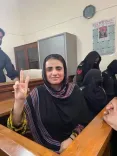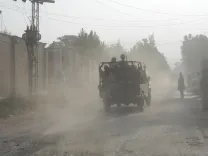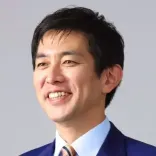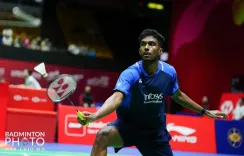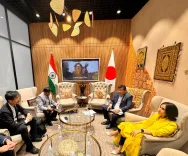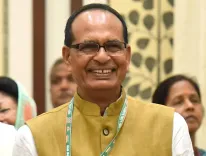Can Nepal Find a Constitutional Solution to the Gen-Z Protest Fallout?
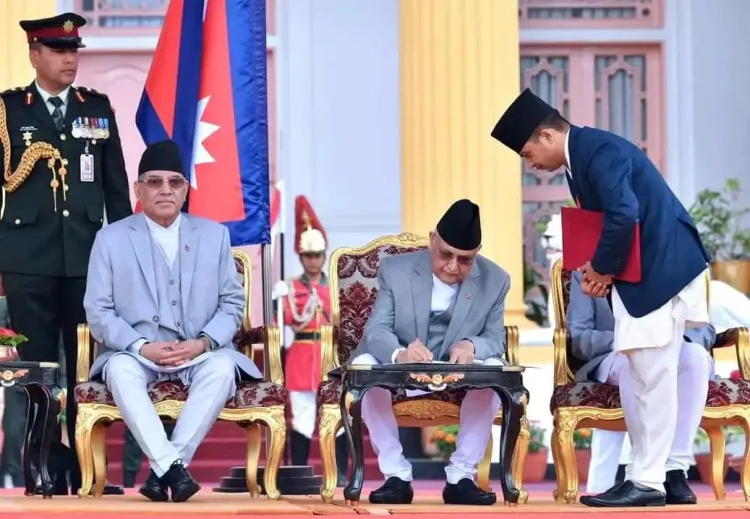
Synopsis
Key Takeaways
- President Poudel stresses the need for constitutional solutions.
- The Gen-Z protests have raised significant concerns about democracy.
- Dialogue is ongoing between the Nepal Army and protest leaders.
- Political parties advocate for adherence to constitutional norms.
- Former Chief Justice Sushila Karki is a leading candidate for the interim government.
Kathmandu, Sep 11 (NationPress) The President of Nepal, Ram Chandra Poudel, stated on Thursday that measures are being taken to seek a resolution within the established framework as apprehensions arise regarding a possible departure from the constitutional path in addressing the country's political turmoil following the Gen-Z revolution.
"In the present challenging climate of the nation, I am actively engaged in discussions, and all possible efforts are directed towards finding a resolution within the constitutional framework to pave the way forward for our country, protect democracy, and ensure peace and order," President Poudel remarked.
He called upon all factions to trust the initiatives being undertaken to meet the demands of the Gen-Z protesters, urging them to cooperate peacefully in maintaining order within the nation.
The President's comments come as political parties, leaders, and civil society members express concerns over democracy's fate if solutions stray from the constitutional route.
Currently, Gen-Z leaders, who initiated protests against the government of Prime Minister K P Sharma Oli leading to his removal, are in talks with senior officials of the Nepal Army, who are tasked with preserving law and order and have imposed a curfew until Friday morning in the Kathmandu Valley.
With the Nepal Army leading dialogues with the Gen-Z representatives, certain groups remain on the streets advocating for the preservation of democracy and opposing any military governance. Despite the ongoing discussions between the Nepal Army and the protesting leaders, President Poudel has indicated he is overseeing negotiations as the ceremonial Commander-in-Chief of the Nepal Army, as outlined in the constitution.
Former Chief Justice Sushila Karki seems to be a leading candidate for the next interim government, receiving support from Kathmandu City Mayor Balen Shah.
However, some Gen-Z leaders have proposed alternative candidates, including Kulman Ghising, the former Managing Director of the Nepal Electricity Authority, arguing that according to the constitution, a former Chief Justice is ineligible for any government role. Ghising is recognized for resolving the persistent issue of power outages in the nation.
Major political parties in Nepal have stressed the importance of adhering to the constitutional process.
In a press release, the Communist Party of Nepal (United Marxist-Leninist) or CPN (UML) stated that after Prime Minister Oli's resignation, the path forward must be sought constitutionally and democratically.
The party, whose chairperson is the ousted Prime Minister, urged President Poudel to initiate substantial dialogue aligned with the Constitution's spirit.
The Communist Party of Nepal (Maoist Centre), led by Puspa Kamal Dahal, has also emphasized the necessity for a resolution through constitutional means.
"Any political resolution pursued outside the Constitution and the Legislature-Parliament would ultimately lead to regression," the party asserted on Thursday.
Nepali Congress General Secretaries Gagan Thapa and Bishow Prakash Sharma highlighted on Wednesday that any decisions made under the "doctrine of necessity" must advance through constitutional and legal channels.
"Lawlessness will only invite further chaos. Hence, we urge the President and the Gen-Z representatives to ensure every possible legal measure is adopted to prevent a prolonged constitutional void in the nation during the dialogue process," they stated.
All three political parties have condemned the vandalism of public and private properties during the unrest on Monday.
Parties based in the Madhes region have also proposed that the constitutional path must be followed. "Federalism, republicanism, and inclusivity must not be reversed, as these gains were achieved through the sacrifices of many Nepali citizens," stated the Rastriya Mukti Party Nepal, a Madhes-based party.
A civil society group, the Brihat Nagarik Andolan (Extended Citizen Movement), has expressed concerns regarding the Nepal Army's involvement, accusing the organization of negotiating with elements that infiltrated the Gen-Z movement and, from the second day onward, acting strategically to undermine all state institutions accountable to citizens, as well as the private sector.
As worries mount over the future of democracy in the nation, the movement has called for solutions rooted in the Constitution without deviating from its framework.

